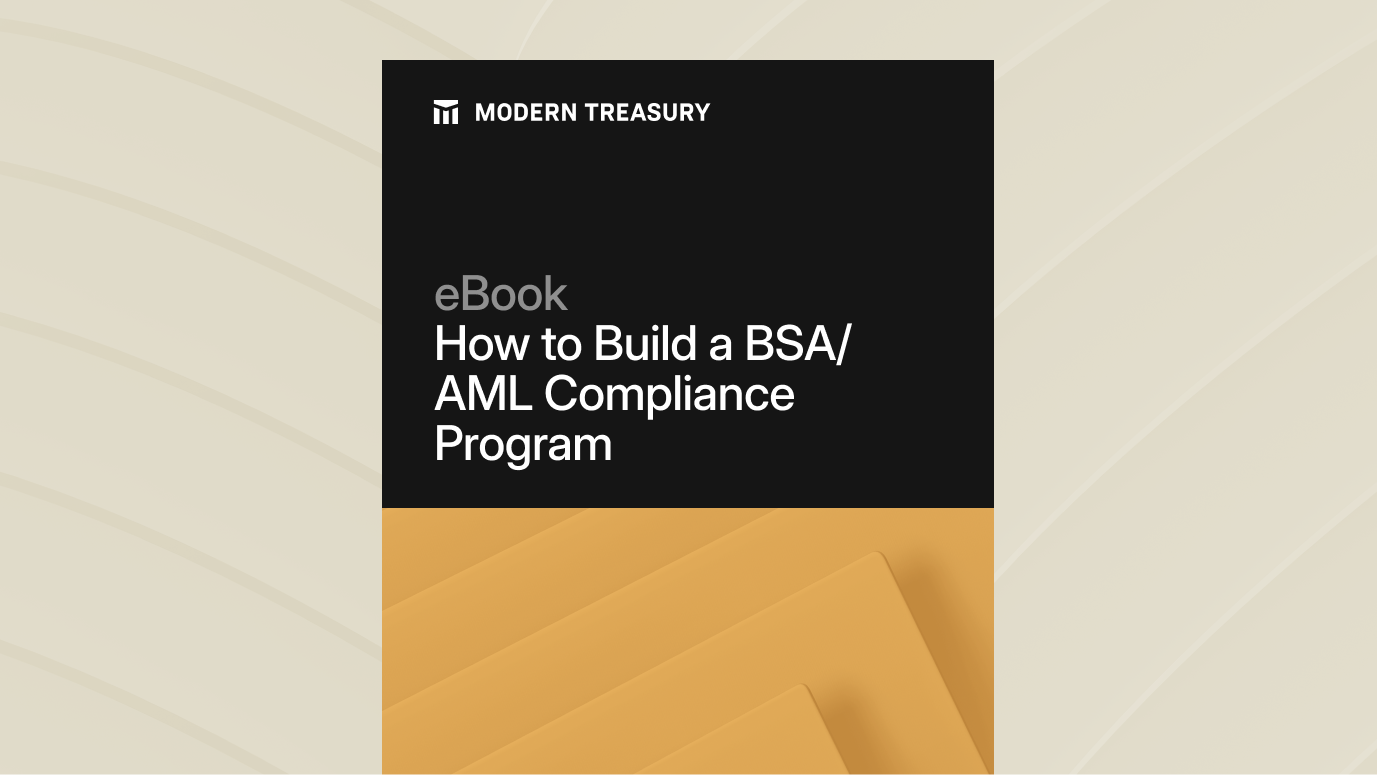Join us at Transfer 2025 to hear how industry leaders are building payments infrastructure for a real-time world.Register Today →
Building a Culture of Compliance
Compliance is a tricky, but vital part of launching a fintech product. This journal covers key takeaways from our webinar on building a culture of compliance.

Last month, Modern Treasury hosted a webinar discussing what it means to “build a culture of compliance” and why that’s something every commercial bank looks for when underwriting a prospective partner. Moderated by Eric Greenstein, Compliance Product Manager at Modern Treasury, the panel included Megan Arias, Business Operations at Increase, Zach Figueroa, Chief Compliance Officer at bitFlyer USA, and Rick Bachman, Founder and Managing Member at Scale Group.
Below, we’ll look at some of the key takeaways from our discussion, but first, let’s level set on what we mean by a “culture of compliance”.
The Core Components of a Culture of Compliance
Building a robust, well-running BSA/AML compliance program requires a business to keep compliance top-of-mind for everyone. While this may not be a core competency for every business, there are some things that can be done to make compliance a focus across the organization:
- Be ready to allocate the resources. One mistake that businesses sometimes make is waiting to set up a compliance team. It can be tempting to focus on putting policies and procedures into place first, but ensuring that there is a staff who will be overseeing compliance is actually a better first step in most cases. Hiring a Chief Compliance Officer or finding a compliance consultant to work with early in the life of the business is a key part of building a culture of compliance.
- Understand the regulations. Not every business is subject to the same types of financial regulation or compliance standards. Understanding how relevant regulations will specifically impact your business and having someone on staff who can speak to what is relevant and what is not is imperative to a successful compliance program.
- Build cohesion into your organization. Find a way to make sure that all teams across your organization can collaborate and buy into the importance of compliance. Your compliance team shouldn’t be the hall monitors of your organization—showing up at the end of a build and then looking to find all the mistakes—they should be the librarians, acting as ongoing resources to offer support.
3 Key Takeaways from our Panel
1. Bank due diligence is imperative to success. Different types of banks are better suited for different types of businesses—and compliance is no different. When a business is vetting bank partners, it needs to feel like a true partnership. It’s important to remember the purpose of due diligence: banks want to try and identify potential issues before working with a business, because the bank is also responsible for issues that arise.
The due diligence checklist. There are a variety of different questions that your bank may ask of your business during due diligence. Some common questions include:
- Business background: Who owns the company? How much money does the business have and can you afford to build your business? What is your product? What type of customers do you expect to have?
- Current compliance policies: Do you have policies for different compliance-related scenarios? What is your procedure for disputes or customer complaints? Do you have AML and KYC set up and a team to manage them?
- Your product: Is your platform secure and have you stress-tested it? What policies do you have around how you build and manage changes to your platform?
2. Ensuring compliance to regulations depends on how you decide to move money. Bank partners will want to understand how you’re to structuring your flow of funds to determine which regulations apply. The most important consideration here is figuring out how you comply with money transmission laws. There are two scenarios to consider:
- Using a money transmission license to move money. If the bank determines you need a money transmission license, you’ll need to procure both federal and state licenses. Licenses are required for every state you’re operating in, since money transmission is regulated at both the state and federal level.
- Using a custodial FBO account for moving money. An FBO account allows your business to manage funds on behalf of your customers, without assuming legal ownership of the account. Instead, with an FBO you are relying on the bank’s money transmission license, as they are essentially lending that license to you. As a result, the bank will be much more involved in your compliance program and overseeing your money movement and banking relationship.
3. There are tradeoffs to consider if using a Banking as a Service (BAAS) Provider. BAAS providers can offer easier access to technology, and, in a lot of cases, that can mean faster speed-to-market for new products. While it may be tempting to take advantage of a BAAS provider right away, it is important to consider the pros and cons.
- Pros of using a BAAS provider include the potential for an increased speed to market and lower initial startup costs. Especially for non-finance companies, BAAS providers can also open up the opportunity to offer financial products and services quickly and easily.
- Cons of using BAAS providers include less granular control over your compliance program. Because you are outsourcing to a BAAS provider, not everything will be custom built for your specific business. Just as your business is different from others, you want your compliance program to be specifically suited to your flow of funds, customers, and banking relationships. Even if a BAAS provider says that they can handle compliance on behalf of your company, if an issue arises your company–not the BAAS provider–is ultimately on the hook for resolving it.
Questions to consider before using a BAAS provider:
- What will we do if we decide we want to leave our BAAS provider?
- What happens in the event of our business shutting down?
- Is it worth it to be tied to this BAAS program long term?
- Do I know what parts of compliance my BAAS provider handles and which our business needs to handle directly?
Solve the Compliance Struggle For Your Business
Modern Treasury’s Compliance was created to address the challenges that come with custom-building your own compliance program. Reach out to us to find out how we can help.
You can watch a recorded version of the webinar here.
Try Modern Treasury
See how smooth payment operations can be.







